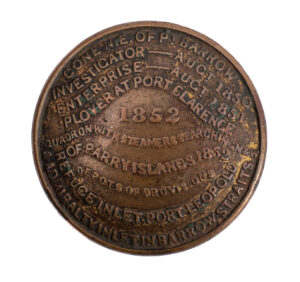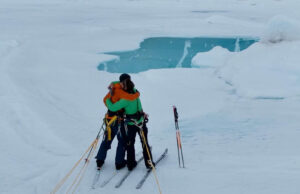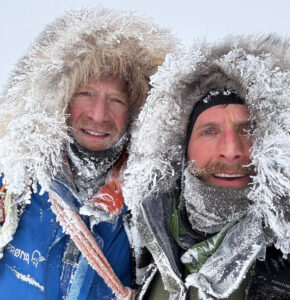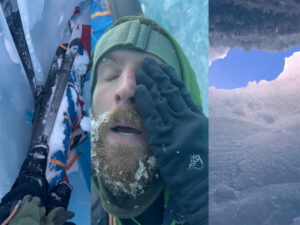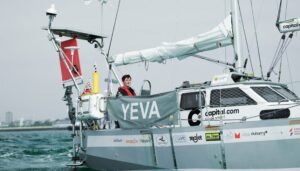Wind and waves in the Northwest Passage ended more than one expedition through the legendary channel this year. Brazilian sailors Beto Pandiani and Igor Bely had set off in their small catamaran in July. Like West Hansen and Jeff Wueste, they eventually elected to call it quits in Arctic Bay, but Pandiani and Bely had set off from the other side of the passage, west to east.
The Brazilians very nearly made it. They had covered 2,500km and were less than 400km from Pond Inlet, the end of the Northwest Passage.
Theirs would have been the first catamaran journey through the Northwest Passage in a single year. In the 1980s, two adventurers made it through, but it took them three summers to do it in sections.
From their start in Tuktoyaktuk, the Brazilian pair almost immediately encountered ice.
“It’s impossible to know where it’s more ice-free. We can see about 50m, which makes the sailing very tense,” they wrote on July 21. Picking their way through the ice, they edged toward the village of Paulatuk. There they anchored and enjoyed some sleep and food in town.

All iced up. Photo: Beto Pandiani
Ice still vexes Northwest Passage
As early as July 26, they were aware that the tail-end of their journey would be complex: “Ice charts show that after Cambridge Bay, the sea is very frozen. We have this equation to solve. The sea should be more [melted] by the end of August. But will we have time to sail 1,500 pretty complicated miles from August 20 to September 20?”
On August 5, they reached Cambridge Bay and took some time to prepare for the journey to Gjoa Haven. By complete chance, while still in Cambridge Bay because of bad weather, they ran into another Brazilian boat crew. In another wrinkle of improbability, a local policeman was married to a Brazilian, who was hosting family from home. And so, in Cambridge Bay, a world away from Brazil, they all celebrated their chance encounter.
After this reprieve, it was back to the ice and wind. Picking their way to Gjoa Haven past the southern end of King William Island, they had to take shelter from strong winds more than once. The conditions only got worse.
“Here in the Arctic Ocean, just where we are there is a lot of current, and whenever wind and current are in opposite directions, the sea boils. Today we had the displeasure of sailing in a sea of shit,” they wrote on August 18.

A clear day with little ice. Photo: Beto Pandiani
Rough weather, late season prompt decision
In Gjoa Haven, they again checked the ice charts. The news was not good. They’d be stuck in Gjoa Haven for a few days.
On August 29, they finally crossed Bellot Strait, the kilometre-wide channel into the eastern side of the Northwest Passage. This final stretch was very difficult, with a lot of ice, and waves that buffeted their boat from two directions. The same conditions caused the Arctic Cowboys to abort their expedition in mid-August. After much struggle, and thoroughly soaked and frozen, Pandiani and Bely finally made it around a headland into Arctic Bay in early September.
They could have continued, but the weather gets rougher in September, the temperature can drop below zero, and it does begin to get dark at night again, after an entire summer of 24-hour light. They’d had enough.

Sailing through calm Bellot Strait. Photo: Beto Pandiani
A logistics company will transport their boat back to Brazil, while Pandiani and Bely will fly to Ottawa and then onto Brazil tomorrow.
You can find an excellent breakdown of their journey on Pandiani’s Facebook here.

